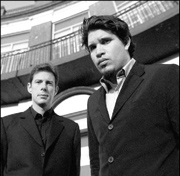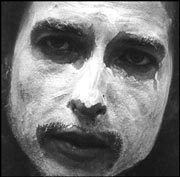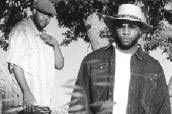THIEVERY CORPORATION
Showbox, 206-628-3151, $20 adv.
9 p.m. Tues., Nov. 26
THOUGH THEIR EARLIEST notice and props came from within the District of Columbia’s underground DJ scene, the work of Thievery Corporation is more closely akin to “world music” in that term’s most precise sense.
(Pause: If you’re still reading, you might be among those who recognize the difference between the synthesized mush that generally falls under the “world music” heading and the serious work of performers like the Chieftains, whose inclusionary aesthetics admit no generic boundaries. Good music is good music, and any political or cultural division between communities produces not solid boundaries but a border zone where genre classifications rarely prevail. This border, the lively and vibrant frontera, is the landscape Thievery Corporation work. If you can dig that distinction, read on.)
We’re not talking about the bloodless, pseudo-global mishmash foisted upon us by lite jazz offenders. Rather, Thievery Corporation’s M.O. is precisely what the duo’s name suggests—a professional raid, an expert looting of South and Central American, Asian, and European beats and melodies, a meticulous grafting and suturing that results in something both global and local. These are, after all, a couple of D.C. boys—two young fellas living and working in what’s arguably America’s most aggressively international city.
“It’s not a conscious project to make people more mindful of the variety of cultures and nations on the earth,” insists Rob Garza—one-half of Thievery Corporation, along with compatriot Eric Hilton. He says this repeatedly, but to consider the total presentation of The Richest Man in Babylon, the duo’s latest release, it is necessarily to meditate upon just this kind of diversity.
Richest Man‘s packaging is elaborate (and, word to the wise, extremely fragile): a cardboard slip case, an all-white plastic CD jacket housing an all-white CD, and a sizable separate booklet containing black-and-white photographs taken in settings and situations around the world.
Though credited by photographer and location in the back of the book, the uncaptioned, full-page images are readable even without these prompts: An elderly, stick-thin Mexican man happily flaunts a biceps the approximate size and consistency of a raw red potato; a shepherd tends a flock toward the setting sun; a young man, beaten and evidently hog-tied, lies at the feet of uniformed soldiers; a small boy leans against a corrugated fence, one black arm upraised, head morosely tucked into his chest.
Inspired by the Rhumba Caf魭a favorite hangout and Latin-jazz mecca in the D.C. area—and its rotating displays of works by global photojournalists, the visual elements of Richest Man were the last to be assembled—after the music was nearly completed.
“A lot of the imagery evoked emotions that we felt within the music,” says Garza, “kind of a cross-cultural appreciation on our part for the work that these photographers had done. One of the photographers was telling us about how he’d once worked in Rwanda for seven days with the International Red Cross, and during that one week, several thousand people died of starvation and dehydration. And the day that he left Rwanda and went back to London, he was eating a steak that night. It just makes you think about how people know more about who, say, Tom Cruise is dating than they do about what’s really happening in the world.”
Again, we’ve come around to the idea of raising awareness of global issues—something that may not be an intentional part of Thievery Corporation’s music making, but might certainly be considered a peripheral benefit.
BEFITTING AN ALBUM featuring vocalists from myriad countries (the album contains a song written and performed in Farsi—a first, of sorts, for electronic music), Thievery Corporation’s live show offers an embarrassment of riches. Importantly, the shows are live. This isn’t a DJ show; it’s an evening of music conceived and executed by actual humans.
This last point often separates Thievery Corporation from many semi-related electronic/dub/house outfits. “We’re really sort of isolated from a lot of those scenes, because we have our own organic approach to making the music. Our studio is at the 18th Street Lounge, where a lot of musicians are constantly moving in and out, so [the music] tends to develop its own focus as a result of being around all that talent.”
Too, they have done their musical homework and boast unique CVs within the electronic music scene. Hilton first cut his teeth in garage bands at the age of 11, while Garza counts the Pixies, Johnny Cash, and Sam Cooke as early eye-openers. (The Pixies “sang in Spanish, their phrasing was so unique, and their lyrics talked about whores, insanity, and mutilation,” he says. “How could anyone not like the Pixies?”)
“We felt a lot more confident with the songwriting [on Richest Man],” notes Garza. “Our biggest influences are older music. There’s a certain warmth to music that lasts, and we wanted to pay respects to that.” (For more explicit props, check out last year’s Sounds From the Verve Hi-Fi, a compilation of largely forgotten jazz gems from that venerable label, compiled by Hilton and Garza.)
At last—and we’re talking about the music, remember—Garza finally hits upon the conscious project. Once again, the margins come to the center: “We wanted to stretch things out in terms of the writing and even in terms of addressing weightier topics within the music. There’s a lot of faceless cool in the down-tempo, lounge, chill-out scene that results in an essential meaninglessness.
“We wanted this album to say something,” he finally concedes. “About the world. About the larger picture.”









